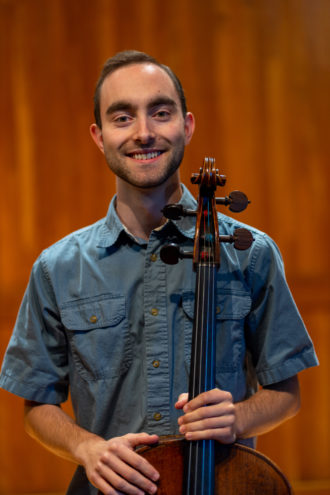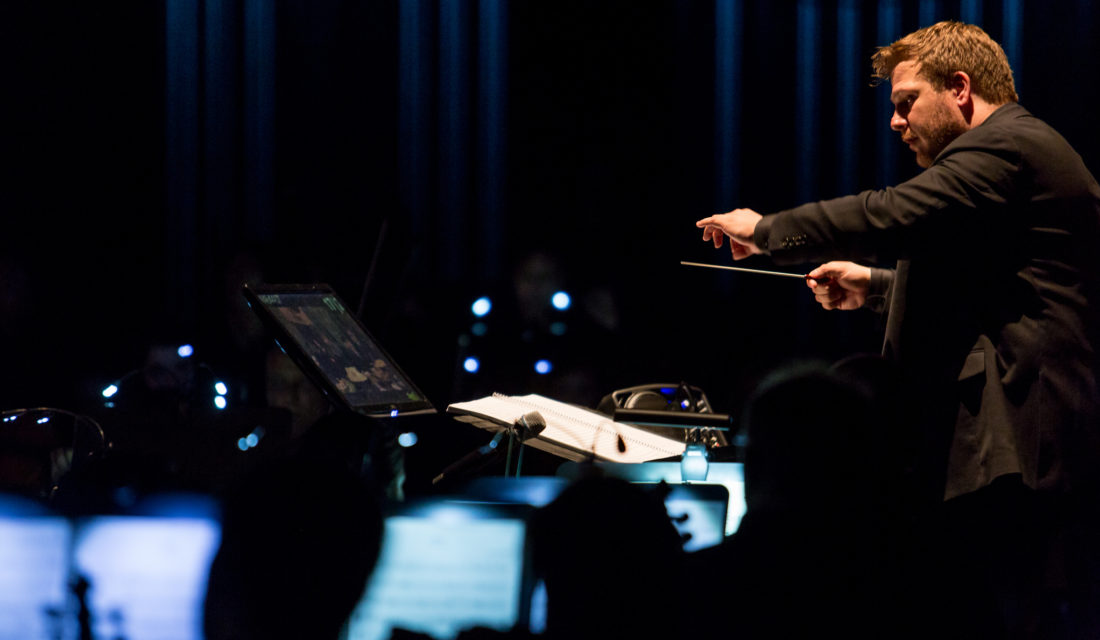Whether it’s Star Wars, Jaws, Raiders of the Lost Ark or the theme for the Olympic Games, John Williams has composed some of the most iconic orchestral music of the past 50 years. But according to fellow Los Angeles-based composer John Jesensky, Williams is “just like every other music person — or anyone who really loves anything” in that he just wants “to talk shop and meet other like-minded people.”
As members of a small but tightknit community, the two Johns occasionally cross paths at professional gatherings and have shared several conversations over the years. And when Jesensky started conducting live orchestral performances of Williams’ score for Harry Potter and the Sorcerer’s Stone, with the 2001 film projected above the musicians, he turned to the maestro for advice — and was not disappointed.
“He is one of the nicest guys that I’ve ever met,” Jesensky says.
Their conversations are sure to be on Jesensky’s mind Saturday, July 29, at 8:30 p.m., when he heads east to conduct the Brevard Sinfonia in Harry Potter and the Sorcerer’s Stone in Concert at Brevard Music Center’s Whittington-Pfohl Auditorium. The young musicians from across the U.S. representing BMC’s college division will be playing through the entire 2 1/2-hour film, providing an exciting new experience even for attendees who’ve seen the J.K. Rowling adaptation numerous times.
“All of the sound effects, dialogue, etc., are all in there — just with the recorded score removed so we can provide it live,” says Jesensky, who notes that the film is subtitled. “We put a lot of emphasis on making it a really cool film screening experience, but at its heart, it’s also an orchestra concert.”
Rehearsal process
A native of Massachusetts, Jesensky says he knew from a young age that he wanted to be a composer and orchestrator. He went on to earn a Bachelor of Music in composition from the Hartt School of Music and a master’s degree in music from the scoring for film and multimedia program at New York University.
After moving to LA, he began making inroads into composing and was hired by CineConcerts — which produces Harry Potter and the Sorcerer’s Stone in Concert and similar events — to restore Nino Rota’s score for The Godfather.
Over the next few months, Jesensky digitized the legendary Italian composer’s original manuscript, preserving it for future generations and readying it for one of CineConcerts’ live performances. Despite his familiarity with the score, he was still surprised when CineConcerts sent him to Montreal with two days’ notice to conduct The Godfather: Live.
Though Jesensky says he panicked as soon as he accepted the assignment, he had an advantage over many others in his field. During his undergraduate studies at Hartt, he learned how to conduct using a system from the early days of film scoring whereby he’d look at a screen and be cued by “streamers” and “punches” — lines and hole punches added to the celluloid film to help the conductor sync the music with the action.
Rather than look up at the projected film, modern conductors keep their focus between the film score on their music stand and a computer monitor set up just behind it, on which the movie plays. But the same system of onscreen glyphs — now in digital form — still pops up at critical moments to help alert Jesensky to particular sequences of notes in the score. The setup also allows him to swivel his head around and engage with the musicians, who are sometimes caught up in the overall experience a little too much.
“It’s funny: I occasionally catch the front row of the strings, who are right on my same plane, watching my screen and watching the movie along with it,” Jesensky says. “And sometimes we have to catch each other and be like, ‘Oh, we’re about to play. Here we go.’ I’ve almost gotten caught before where I’m just chuckling along with the movie and then I see — I have a little countdown that tells me when the next thing’s about to start. And it’s at five seconds it’s like, ‘Oh no!’ And I bring my arms up really quickly.”
Hedwig’s theme
Jesensky’s work with CineConcerts and industry peer Avex Classics International has taken him around the world and added Star Trek: The Ultimate Voyage and Amadeus to his repertoire. But getting to conduct Harry Potter and the Sorcerer’s Stone holds special significance for the artist.
A high school sophomore when the film premiered in November 2001, Jesensky was already a fan of Williams’ work, particularly Jurassic Park. Though primed for this first cinematic visit to Rowling’s wizard world, the teen was nevertheless entranced by the way Williams’ music enhanced the visuals.
“I was sitting in the theater, and then the lights go down, and you see the Warner Bros. logo with that flurry of notes in the strings, and I was so instantly transported to this magical world. It was one of those moments where you lose your breath,” Jesensky recalls. “And then you go to this night scene, and there’s this sort of creepy but also magical celeste. And I was just so sucked in. I remember afterward thinking, ‘I have to do this for a living.’”
Now having conducted the film’s music numerous times, Jesensky considers it “the quintessential John Williams score,” primarily because he feels the sonic palette makes viewers “believe everything” in Harry Potter’s world.
“He is putting you in the mind of the main character. If Indiana Jones punches someone or if he’s running from something, [Williams is] not writing about what’s chasing him. He’s not writing just his footsteps. He’s trying to write music that’s going on in Indiana Jones’ head — like, panic or just, ‘Gotta go, gotta go, gotta go,’” Jesensky says.
“And that’s what he does with Harry Potter. When he is flying on his broomstick for the first time, it’s this elation — and it’s very difficult music for the strings. They are tormented through this whole first movie. It’s constant 32nd notes all over the place. But he’s doing that to simulate the feeling of taking flight.”
While he usually only gets around four hours of rehearsal with an orchestra for the film events, Jesensky is looking forward to having a handful of practices with the Brevard Sinfonia “to really dig into the music with the students.” Noting that such live cinema performances are “a major part of orchestra repertoire now,” he’s also excited to help these musicians gain a set of skills that he says is vastly different from typical symphony work.
Cherishing the opportunity

Among the performers is one Western North Carolina native, Asheville-based cellist Elijah White. Though he’s attended a few silent film screenings with live piano accompaniment, Harry Potter and the Sorcerer’s Stone in Concert marks his first time playing for a live score performance.
“Preparation for a concert like this is much more like an opera or a musical than a typical symphonic concert. First off, there is just tons of music. It requires fast-paced learning and extra flexibility,” White says. “And then there is the coordination of the orchestra with the film. The conductor is the only thread keeping the music and visuals together, so they must have immense precision, and the musicians must be willing to respond to anything the conductor indicates extra quickly.”
Like Jesensky, White also fell in love with classical music primarily through film scores. One of his professional goals is to be involved in the process of making music for films as his career develops, and he’s cherishing the opportunity to take his first steps in that journey so close to home.
“There is something special about meeting people from all over the world at [BMC], all while being hardly an hour from my doorstep,” White says. “For the many people who have never been to this area before, I get to introduce them to a place I proudly call home.”
Along with his conductor and fellow musicians, White will also be part of a much larger introduction process whose benefits extend well beyond the professional realm.
“Doing these performances, one of the most rewarding parts of it is when you see all the kids in the audience, or even the adults who’ve never been to a classical performance before, either because they didn’t think it was their thing or they were maybe even a little intimidated,” Jesensky says.
“A lot of people who have never been to see an orchestra do their thing show up to these [events] and are blown away. And hearing the little kids giggling or gasping and just having a great time, it’s great. I hope at least one person — a young person or adult — goes, ‘You know what? I’m going to come back for the next performance.’”




Before you comment
The comments section is here to provide a platform for civil dialogue on the issues we face together as a local community. Xpress is committed to offering this platform for all voices, but when the tone of the discussion gets nasty or strays off topic, we believe many people choose not to participate. Xpress editors are determined to moderate comments to ensure a constructive interchange is maintained. All comments judged not to be in keeping with the spirit of civil discourse will be removed and repeat violators will be banned. See here for our terms of service. Thank you for being part of this effort to promote respectful discussion.